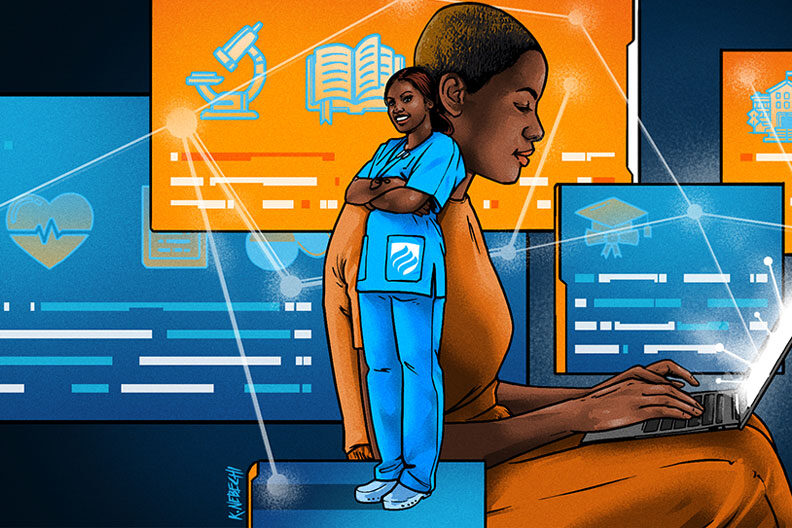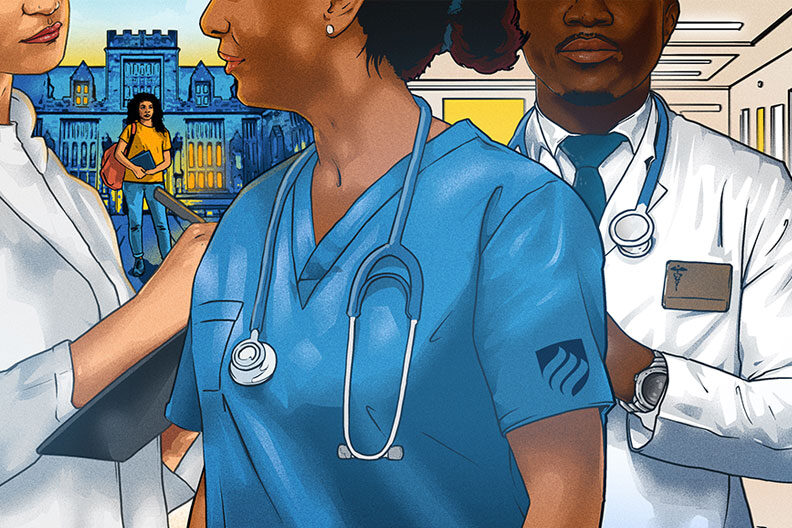Can You Be a Nurse Without a Degree in Nursing?
DEGREE COMPLETION PROGRAMS | 3 MIN READ

The demand for nurses has been so high recently, hospitals and clinics probably wish they could wave a magic wand and transform masses of aspiring clinicians into RNs. But it just doesn’t work that way.
Anyone who wants to work in nursing has to put in plenty of time and effort, whether by finishing a nursing diploma program, earning an associate degree of nursing (ADN) or completing a bachelor of science in nursing (BSN). What’s the difference? The most immediate is the time commitment.
- A nursing diploma or certificate program is typically offered by hospitals, technical schools or community colleges and is the most accelerated way to become a registered nurse. These programs do not include general education classes and can be completed in one to three years.
- An associate degree of nursing takes two years (60 credit hours) and, like a diploma program, focuses on nursing-specific topics but also includes some general-education coursework.
- A bachelor of science in nursing is more in-depth than diploma programs or ADNs. Core nursing courses form the framework, but students also take deep dives into advanced topics such as leadership, informatics, research and public health. A BSN usually takes four years (120 credit hours) to complete.
Regardless of the pathway, all nursing candidates embark on some combination of coursework and clinical hours and must pass the National Council Licensure Examination (NCLEX) before they can practice.
Based solely on the time investment, some students may opt for a diploma or an ADN. But the initial outlay of time for a BSN translates into long-term career benefits for nurses:
- Better preparation and knowledge of the field: A BSN prepares nurses for potential specialization in a variety of areas, including pediatrics, obstetrics and gynecology, hospice and palliative care.
- Broader career advancement opportunities: Candidates with BSNs are considered by most employers to be preferable to candidates with diplomas or ADNs. According to a survey last year by the American Association of Colleges of Nursing, more than 40% of hospitals and health care facilities require a BSN, and twice that percentage prefer it.
- Pathway to continuing education: A bachelor’s degree is a prerequisite for graduate studies or advanced-practice nursing.
- Higher pay: Average pay for a nurse correlates to his or her degree: A registered nurse who completes a diploma program earns $65,700 a year, according to Payscale; a nurse with an ADN makes more than $70,000; and a BSN puts nurses on the path to earn more than $86,000 a year on average. In addition, a bachelor’s in nursing qualifies professionals for the highest-paying jobs, such as RN directors, at $92,000 annually, or a clinical nurse manager at $87,000.
And though a bachelor’s degree takes more time, for practicing nurses who want to complete their degree, RN-to-BSN programs allow for accelerated formats. Some can be finished in just four semesters by building on previous coursework.
At Elmhurst University, the School of Health Sciences offers seven programs of study — three at the undergraduate level and four at the graduate level or above — for those seeking a career in nursing. These programs are designed to meet students where they are and to prepare them to reach their full potential in a vibrant career.
Complete the form below to request more information today!




